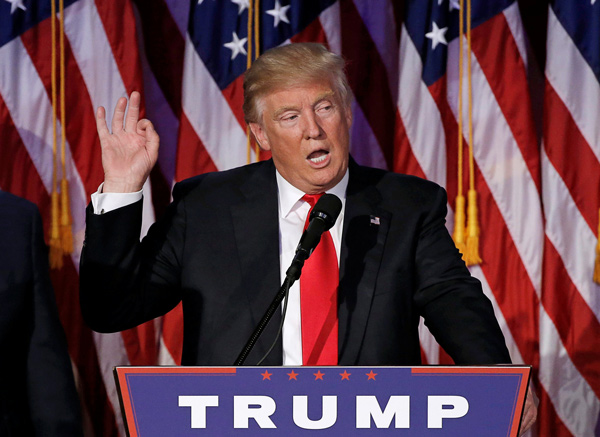Media Report

- New York Times reports: "When President-elect Donald J. Trump spoke on the phone with Taiwan's president on Friday, he was wading into one of Asia's longest-running and sensitive issues: the dispute between Taiwan and mainland China...The disagreement dates to 1927, when civil war broke out in the Republic of China. The war culminated in Communist revolutionaries, led by Mao Zedong, mostly defeating China's Nationalist government in 1949...Since then, no American president or president-elect is believed to have spoken with a Taiwanese president — until the phone call on Friday."
- Reuters reports: "Iran's nuclear deal with six major powers should continue regardless of changes in the internal situation of participant nations, China's Foreign Minister Wang Yi told Iran's visiting foreign minister during a meeting in Beijing on Monday..."We will not let any country infringe the agreement unilaterally," he added. "But if they do, Iran has its own options."...Iran has said it seeks to expand economic and security ties with China, following a visit by Chinese President Xi Jinping in January. Tension between Iran and the United States over the accord had already risen before the election, after the U.S. Senate voted a ten-year extension of the Iran Sanctions Act (ISA). Iran vowed to retaliate."
- Los Angeles Times reports: "Remember when China was the climate-action outcast, the obstacle standing in the way of progress in the global fight against a warming planet? What a difference a few years — and an election — can make...During the Marrakech talks, the official Xinhua News agency stated, "China is playing an active role in negotiation and global governance on climate change. Self-motivated and willing to work with others to save the planet, China has taken steps, including billions of dollars of investment, to tackle climate change and provide new-energy technology."...As 2017 approaches, China is poised to assume global leadership on climate change, and the U.S. is poised to become the new climate-action outcast."
Calendar
- 2016-12-04 Trump Camp Scrambles To Defend Diplomatic Blunder Over China And Taiwan
- 2016-12-02 China Seizes Opening in U.S. Backyard as Trump Upends Policy
- 2016-12-01 China says new North Korea sanctions not meant to harm 'normal' trade
- 2016-11-30 China military says it's seriously concerned by Japan-South Korea pact
- 2016-11-29 China to clamp down on outbound M&A in war on capital flight
- 2016-11-28 Antibiotic-resistance genes in Beijing’s smog are nothing to worry about, Chinese officials say
- 2016-11-25 Trump will pursue 'regional hegemony' in South China Sea: Chinese academic...
- 2016-11-24 China's Economy Looks Like It's Remaining Stable
- 2016-11-23 China Has Warned of Retaliation if U.S. Levies Tariffs, Commerce Secretary Says
- 2016-11-22 China Touts Its Own Trade Pact as U.S.-Backed One Withers
News
- New York Times Trump, Taiwan and China: The Controversy, Explained
- Reuters China says Iran nuclear deal participants should stick to pact, despite internal changes
- BBC News First Minister Arlene Foster begins four-day China visit
- The Washington Post China appeals to US to stop disrupting acquisitions
- The Wall Street Journal China's Clean Energy Push Runs Into Headwinds
- South China Morning Post China's capital on high alert for smog again
- CNN China mine explosion: 32 reportedly killed
- The Wall Street Journal Australia and China Remove Passenger Limits on Air Routes
- Variety China Box Office: Japan's 'Your Name' has $41 Million Weekend
- Reuters China trainmaker CRRC to build more plants abroad in expansion plan
- The Wall Street Journal China: Trump Team Is 'Clear' on Taiwan's Importance to Beijing
- South China Morning Post China's capital controls 'can harm currency, global ambitions'
- The Wall Street Journal Yuan, Taiwan Dollar Slip After Trump Tweets Criticism of China
Commentary
- Los Angeles Times Through climate change denial, we're ceding global leadership to China
- Quartz Trump is right, China has built a massive military complex in the South China Sea- and a soccer field
- New York Times Silicon Valley's Culture, Not Its Companies, Dominates in China
- Quartz How China could react to Trump's taunts, from the best to the worst-case scenario
- Reuters Aixtron could revive takeover despite U.S. block: analysts
- Forbes FCA To Launch Alfa Romeo In China But Will They Last This Time?
